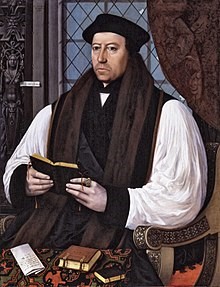Here is the adult lesson that would have been taught tonight at church. Read it over and ponder it. Discuss it with a friend, your spouse, or as a family. Read it over tea or coffee tomorrow. Whatever works for you!
Thomas Cranmer, Reformer and Martyr

Dates: 1489-1556 AD
Locations: Canterbury and Oxford, England
Feast Day: March 21
Context: Thomas Cranmer was the Archbishop of Canterbury who presided over the first phase of the English Reformation and compiled the first Book of Common Prayer. Born in Nottinghamshire, England in 1489, he studied humanities at Cambridge University and was ordained to the Catholic priesthood. Cranmer was appointed Archbishop of Canterbury in 1533. Around this time, the King of England, Henry VIII, appealed to the Pope to get an annulment from his current wife, Catherine of Aragon, so he could marry a woman named Anne Boleyn; the Pope refused. Henry consequently declared himself, and not the Pope, head of the Church in England. Cranmer served on the ecclesiastical panel which would decide Henry’s marital situation. Because Catherine had previously been married to Henry’s older brother, Cranmer judged the marriage to be unlawful under Scripture. Henry was therefore free to marry Anne, which he did. Cranmer’s views became increasingly sympathetic to Reformation teaching throughout his archiepiscopate, and he introduced minor reforms during Henry’s reign, including allowing priests to marry. The Book of Common Prayer, which took the medieval sacramentary and simplified it for laypeople, was released in English and used in parishes throughout the Church in England. When Queen Mary, a devout Roman Catholic, came to power, she imprisoned Cranmer and ordered him to recant his Reformed teachings. He did so, yet the vindictive Mary ordered his execution anyway. On the day he was to be burned at the stake, Cranmer recanted his recantations and denounced the Pope as the antichrist. While the flames drew around him, Cranmer said he would punish “that unworthy hand” which had penned the recantations. He placed his right hand into the fire as the flames began to engulf him. He died with the name of Jesus on his lips. Cranmer is commemorated today as being a primary reformer of the Church of England, the architect of the Book of Common Prayer, and a martyr for the principles of the English Reformation.
Excerpt from “A Homily on True and Lively Faith” in the First Book of Homilies
“There is one faith, which in Scripture is called a dead faith, which brings forth no good works, but is idle, barren, and unfruitful. And this faith, by the holy Apostle Saint James, is compared to the faith of devils, which believe GOD to be true and just, and tremble for fear, yet they do nothing well, but all evil (James 2.17, 19)…Another faith there is in Scripture, which is not (as the foresaid faith) idle, unfruitful, and dead, but works by charity (as St. Paul declares, Galatians 5.6). Which as the other vain faith is called a dead faith, so may this be called a quick or lively faith…Of this faith [these] things are specially to be noted. First, that this faith doth not lie dead in the heart, but it is lively and fruitful in bringing forth good works. Second, that without it can no good works be done, that shall be acceptable and pleasant to God…Be sure of your faith, try it by your living, look upon the fruits that cometh of it, mark the increase of love and charity by it towards God and your neighbor, and so shall you perceive it to be a true and lively faith. If you feel and perceive such a faith in you, rejoice in it, and be diligent to maintain it, and keep it still in you; let it be daily increasing, and more and more be well working, and so shall you be sure that you shall please God by this faith.”
Discussion Questions:
- Do you feel that you have a lively faith, as described by Cranmer? Why or why not?
- What is one concrete way you can express your faith this week?
- What does it mean for faith to work through love (Galatians 5:6)?
- Why is that without faith, we are not capable of bring forth good works acceptable to God?
- How can we be intentional about increasing our faith?


Comments are closed.